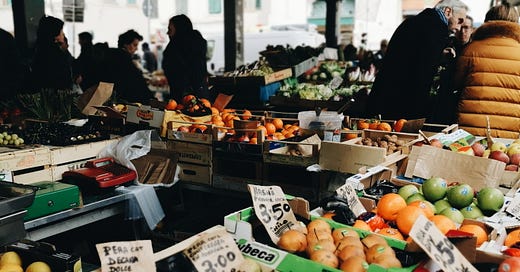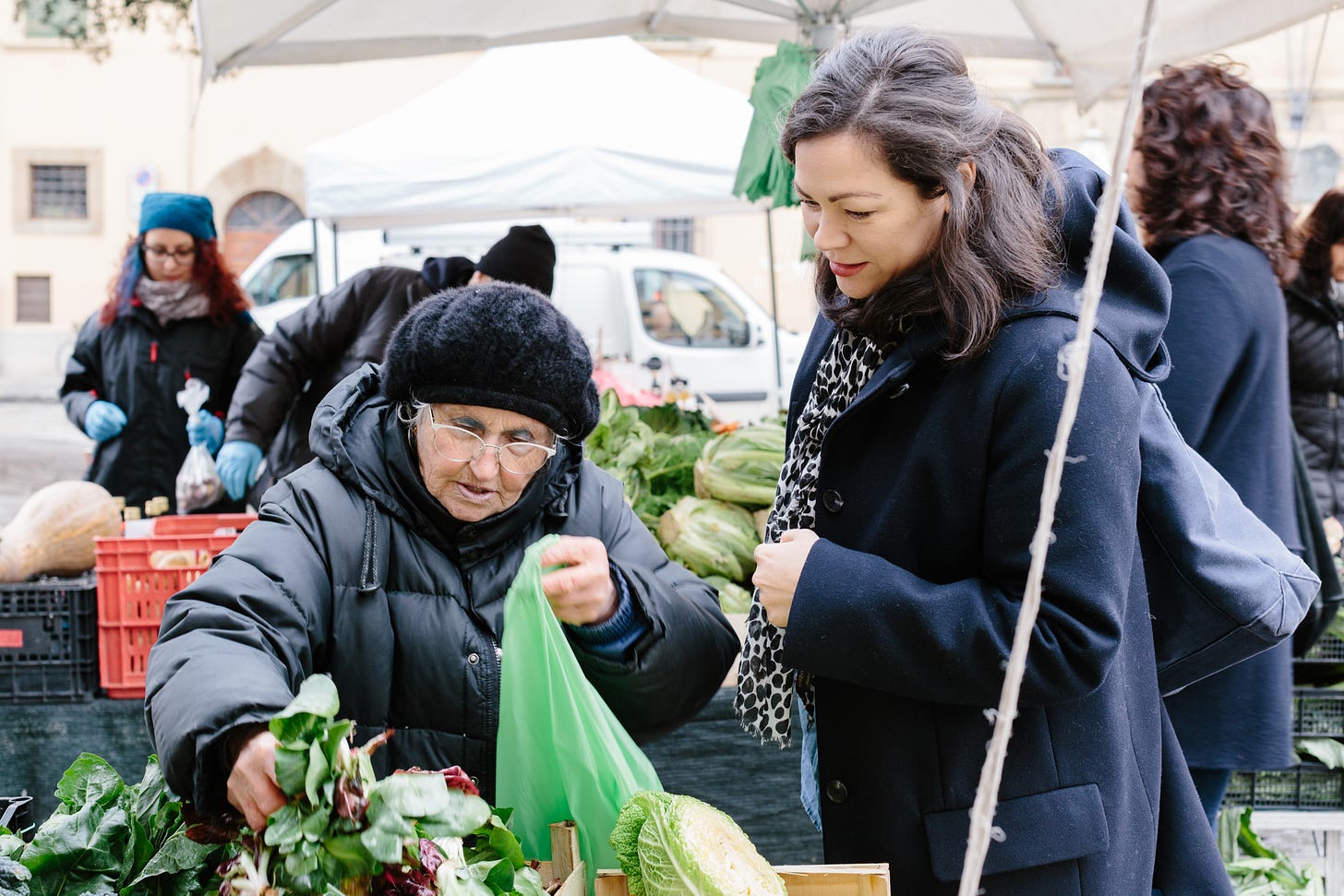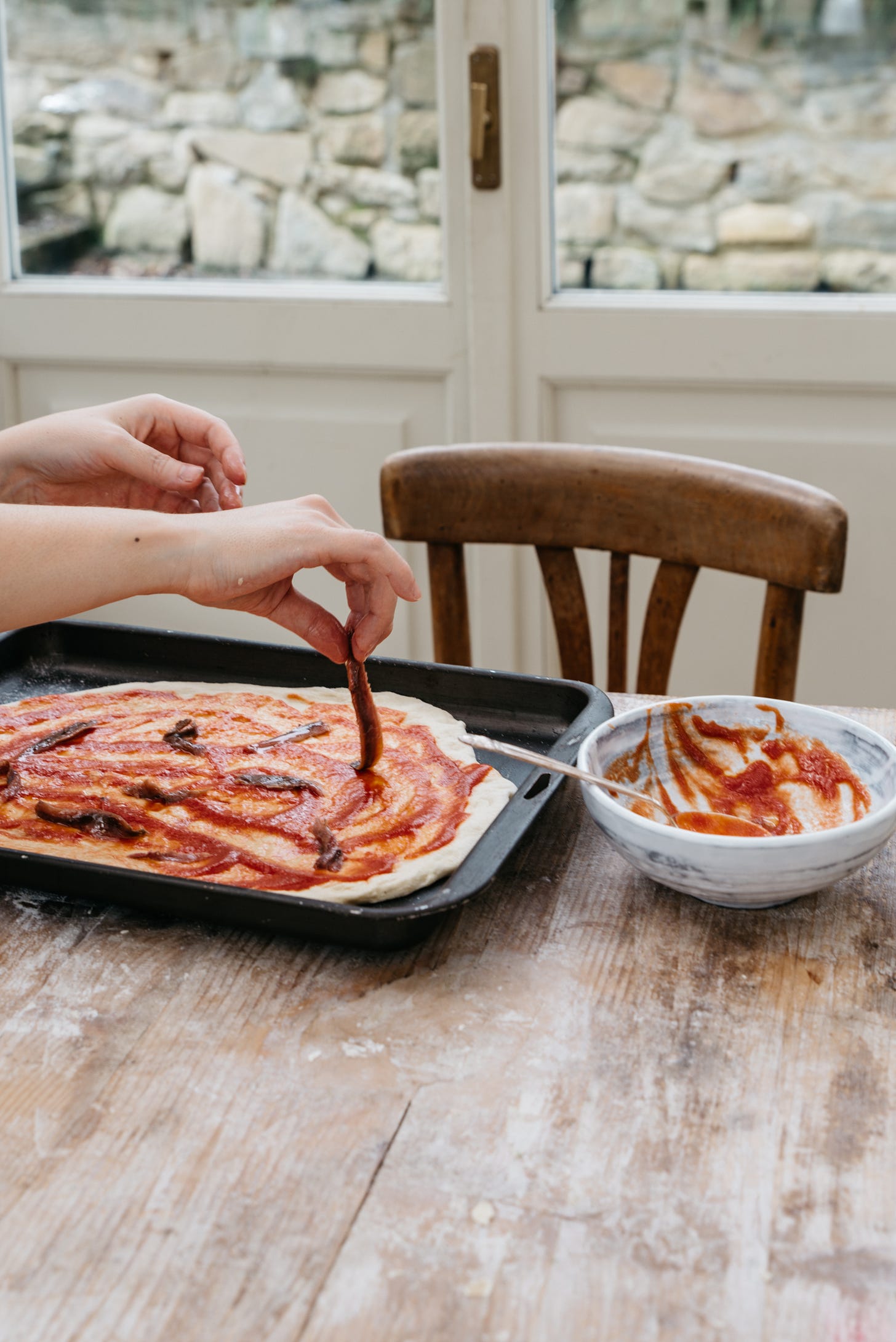“Food is delightful, and food is fuel, and food is culture. It becomes shadowed with shame—often, the sort that can distort our eating habits for years to come—not when we eat it, but when we restrict it, and attempt to spread that shame to others who do not.”
— Anne Helen Petersen
I started this newsletter hoping that it was a way to connect with people and get a regular conversation going around food and some of the topics that mean a lot to me but I think are ones that are more and more important to talk about, like sustainability and breaking free from diet culture, life in Italy and the joy or nostalgia of eating or cooking food. A few weeks ago I posted about what “good food” means to me and how I use food as a playful element at home to encourage my children to feel comfortable and good around it. I received more private letters about this piece than almost anything I’ve written about before and I’m so pleased that it got people thinking and talking.
I realise that some of the things I am writing about might seem controversial to hear from a cookbook writer and that is why I always link to the experts in the field who I am reading and learning from. One particular article linked in that post got some people bothered (or at least stimulated) and I thought I would go more into what this means because if you didn’t get a chance to read it, this one was full of food for thought.
The piece was Anne Helen Petersen’s It’s Time to Stop Saying Junk for Bon Appetit magazine — they ran a whole series on the theme of looking at “Junk food” differently, which I think was also a controversial thing to do but, I believe, it’s a step in the right direction to start neutralising the way people talk about food.
A reader wrote a long and thoughtful letter to me that began with, “I’m not sure I fully am in accord with the first part of the newsletter as I wholeheartedly believe eating healthy is good for us and filling ourselves with junk food is bad. However, I do fully agree that HOW we determine health food and junk food is garbage.”
And I love this conversation starter!
To be perfectly clear, I am *personally* not a fan of fast food, soft drinks or the like. I’ve just never been into them, or candy or even chocolate bars even as a child. Marco, my husband, too is the same. In fact, I had so much trouble looking for photos to illustrate this post! The best I could do was pizza, which we all know is the best food in the world, and some pictures of the market and where we live because fast food is just not that common or even accessible where we are. We live in the middle of a medieval Tuscan hilltop town. The nearest McDonalds (that I know of anyway) is at Florence train station, a 40-ish minute drive or train ride away. So it’s not like it’s that convenient, it’s not even on my radar (in fact there may be closer ones, I just don’t know of them).
But what I find so incredibly compelling about this article is that it opened my mind to what so-called “junk food” could mean for someone else. And I’m incredibly embarrassed to say this but I hadn’t ever thought much about this before.
I had never thought past my own experience of disliking junk food and I instantly felt so stupid and so privileged to be able to say proudly, “I don’t even like junk food and my kids have never tasted it!” It really humbled me. And personally I am really becoming tired of any kind of judgemental attitude over food these days, aren’t you? (I keep thinking of nutritionist
favourite Who sent the food police?! hilarious response to anyone getting judgy over what someone is eating).Reading Petersen’s article made me realise why we should change our attitude and language around food, about labelling things as “healthy” or not, judging what is “bad” and “good” — which should really be a purely personal thing (is this healthy for you and only you).
In the beginning of the article Petersen recalls a worksheet she had to fill out as a child on what foods are “ healthy” and what is “junk”:
“The worksheet didn’t consider how to feed your child when you’re a single parent working swing shift and a Happy Meal or a frozen pizza is the cheapest and most reliable way to feed your kids, or if the nearest fresh broccoli was an hour’s drive away. I loved the junk, the so-called bad stuff too—Lucky Charms, Nacho Flavored Easy Cheese, Albertson’s Fried Chicken. And it didn’t take long for me to understand myself as “bad,” or at least somehow misbehaving, when I ate them, the same way my mom felt bad when she relied on them, as if they were some indicator of her failure as a parent instead of an opportunity for me to have some really delicious chicken.”
You are not a bad person if you eat Burger King or don’t have time to cook for your kids because you’re slaving away to bring in just enough money that you can only spend on fast food because that is reliable and it’s filling and the kids like it, just like you’re not an automatically good person because your kids are eating only kale and quinoa patties. These things don’t make us better or worse people. And they don’t necessarily make us healthier or unhealthier either (consider mental health too).
As Petersen points out,
“Sorting mechanisms. They’re a way of categorizing people by class, education, race, and size without saying you’re categorizing them by class, education, race, and size. And they are almost entirely maintained by those with the privileges and preferences that place them at the top of the hierarchy itself.”
I’m still for home cooked, seasonal food, for me. Because that's what is affordable, accessible and what I like to eat. But let’s be mindful of what it means to other people if we tell them that there is only one way and everything else is morally wrong. Eating only "local, seasonal, from farmers markets,” which I love and am guilty of preaching myself, is maybe “healthy” for many people, but I never considered how inaccessible that might be for other people in other places (I'm learning, always learning, about the actual costs of farmers markets in places outside of Italy and realise how incredibly spoilt we are that shopping this way is so affordable here), that actually this attitude of “one right way” is classist and can be straight up racist (see
newsletter piece on The unbearable whiteness of the local food movement for some more food for thought).Categorizing food can be a very narrow-minded view because it doesn’t at all acknowledge how impossible that advice might be for some people for so many reasons or the reality that many people are struggling to even get their kids breakfast, or any food at all, “healthy” or not — in the US, 12 million children are suffering from food insecurity. In Australia at the moment you may have heard the story of a woman asking if it is safe to eat expired yoghurt, as she wanted to give it to her children as a surprise for Christmas. Expired yoghurt. In one of the richest nations in the world.
So I am trying to educate myself more on this, learn more, dig deeper and be more sensitive about what I actually say — as a food writer I think this is really important as we have some (small) kind of responsibility too over the way food is talked about. Perhaps it’s not as big a responsibility as huge food companies and governments but it’s something.
Just like health is individual, so is choosing what we can afford and how we need to eat and feed our family the best we can. For some people, eating “junk” is not a bad choice, it may be the choice that brings them the most joy, it may be their only choice — the woman who wrote to me that started this conversation told me a story of a Salvadorian friend who grew up in a low income family, with parents who worked all the time, and only ate Burger King for dinner every night. It may be that they are feeding a child with sensory issues that you may not know anything about (here is Katja Rowell MD aka The Feeding Doctor’s similar advice on why packaged snack foods are helpful, not “bad” for kids with sensory issues).
A food and travel loving friend wrote about how difficult travel has been because of her autistic child’s feeding issues and pushing him to try new things is incredibly stressful and challenging. They recently stepped out of their comfort zone and he tasted — and liked — McDonalds for the first time and she literally cried tears of joy. This development is a huge step for her family. It means their world has just opened up and they can now travel further because finding a McDonalds wherever they are going is achievable. This made me feel so incredibly happy for her — and I never, ever thought I would rejoice McDonalds as a win. But it really is, for her.
Another reader wrote to me, it seems that you are on some kind of quest… And yes, I am! I am on a quest to help make people see how — if we can afford to — we should be enjoying food, not demonizing it. We should be appreciating that we have it, relishing it when we can and not being shamed or ashamed of it. This is my quest, and my hope that other people will see that this is is part of having a good relationship with food.
Some more links:
Here is my ode to debunking sugar myths and why there is a place for it (um, joyful, joyful joy!).
Here is my recent podcast where I get to chat to
on her Burnt Toast podcast about parenting a bigger bodied child in public (where even strangers feel the need to comment negatively about my daughter's body). This is for other parents or people whose inner children need to hear this. on Food Security and whose role it is to get a meal ready, that "food security" shouldn't just stop at getting people groceries, but at transforming those ingredients into a decent meal (and who and how that will happen). And related to today’s piece, what if getting food on family’s tables was about finding a way to making “good” slow food affordable and available to those who need “fast food”? I love, love, love this piece and if you click on one link in this article today I encourage you to read this one! Here is a snippet:“The gap between food security and meal security—a crowded space that includes the tools and equipment needed to cook, food preparation knowledge and skills, time to plan the meal and cook it, space to prepare food and store it—is typically the domain of women, especially mothers. Even under the best circumstances, it can be a dark and lonely place.”
Hope you enjoyed this food for thought, I’d love to continue the conversation!








Emiko, I can't tell you how much I appreciate folks like yourself, Julia Turshen and Ruby Tandoh (and many others) for challenging the often very classist and fat phobic food narratives coming from mainstream chefs/cooks/food writers - it seems like getting on the 'anti-ob*sity' bandwagon is every celebrity chef's MO currently (at least here in the UK). As I wrote about recently (https://laurathomas.substack.com/p/fundamentals-what-even-is-health) the vast majority of people can't even afford to eat in-line with the govt's 'healthy eating plan' - yet the govt are simultaneously labelling affordable foods as 'junk' and trying to make them less accessible, rather than meaningfully trying to close the gap in health inequity by addressing the social determinants of health. It's so important for us to step back and consider - who get's to decide what is food worthy of eating, and what is considered 'junk' - and who is really benefitting from that? From a nutrition perspective - I would much rather someone ate a beef burger from McDonald's (that contains a lot of essential nutrients and energy) than go hungry.
Ditto to everything Laura said! There's a certain wonder I feel, seeing your beautiful food photos next to your bold, personal writing that is taking a stance -- it's so unexpected, in the best way. I'd love to talk someday about how these conversations are different in places like Japan or Italy, where "good, clean, fair" food is not considered elitist the way it often is in the U.S., and for many reasons is often more accessible and affordable. I also feel strongly that in addition to removing personal shame from individual food choices, we have to double down on holding food corporations accountable for the power they wield, the products they are pushing, the accountability they are avoiding, and who they are marketing to.